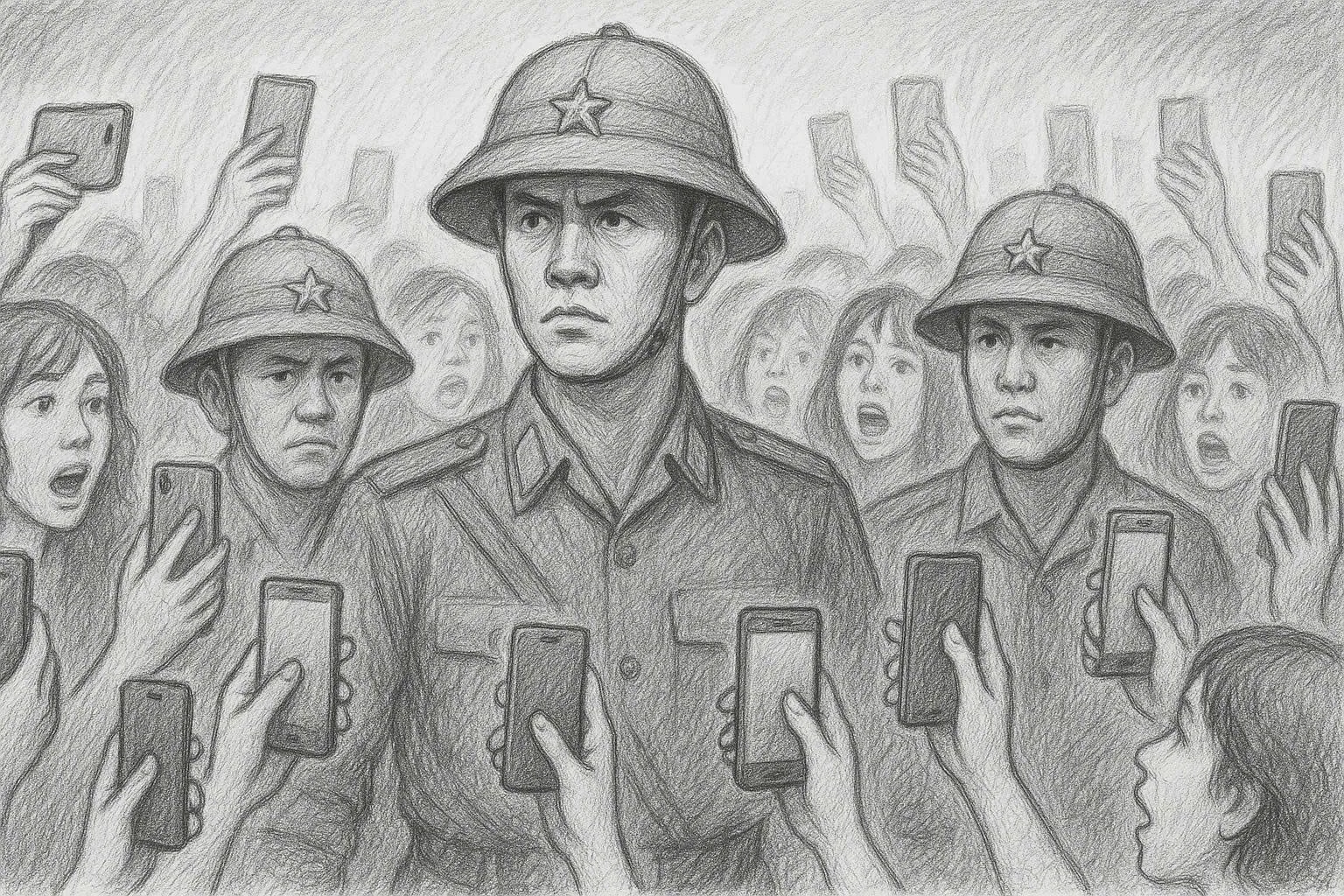What is the threshold for soldiers to become social media sensations and celebrities?
When we think of soldiers, we tend to see them as disciplined, composed men in uniform. It's okay to turn them into idols, but celebrities on social media? Nah. In today's episode of Words on the Street, we'll explore how soldiers react to their unexpected fans.
THE HANOI TIMES — There are perhaps few places like Vietnam, where composed, honorable, and disciplined military men are turned into social media celebrities without any consideration for their embarrassment.
Senior Lieutenant Le Hoang Hiep was awkward to find himself becoming a phenomenon when he arrived at the Hanoi Station on June 6.

Hundreds of his fans crowded the station, shouting his name and grabbing his uniform as if he were their greatest idol. His arrival in Hanoi to prepare with other soldiers for the military parade celebrating the 80th anniversary of National Day on September 2 turned into chaos.
From the 50th anniversary of the Southern Liberation and National Reunification on April 30 to the upcoming National Day celebrations, Hiep has become a social media phenomenon.
He is swarmed by screaming fans, smartphone livestreamers, and photo hunters as if he were a K-pop star rather than a soldier. What began as harmless admiration has now spiraled into a bizarre and troubling reflection of today’s idol-obsessed youth culture.
The image of the Vietnamese soldier, once a symbol of duty and sacrifice modeled on the revered “Uncle Ho’s Army,” is being distorted into a shallow spectacle.
All it took was a photogenic face, a chiseled physique, and a neatly pressed uniform for Hiep to be rebranded online as a "national heartthrob," a "military idol," or worse, a mere prop for social media clout.
Ironically, this disciplined and honorable officer now needs his fellow soldiers to form a protective barrier around him, not for security reasons, but to shield him from crowds of youths clamoring for selfies and viral footage.
This episode is more than a quirky internet fad; it is a cultural wake-up call. It speaks volumes about misplaced admiration, distorted values, and the erasure of personal boundaries in the digital age.
It's not wrong for young people to look up to positive role models. However, when admiration morphs into a mob-like obsession, it becomes a tragicomedy of modern idolization.
What message are we sending when crowds treat a serviceman like a celebrity, blocking his path, chanting his name, and pushing for content to "go viral"?
The answer is uncomfortable. These fans aren't honoring the man; they're objectifying him. While they scream his name, they rob him of his dignity. The soldier must have felt embarrassed, even ashamed, in front of his comrades.
Let's be clear: admiring a soldier's appearance is not a crime. But hounding him, crowding his training ground, and filming him like paparazzi on the red carpet is another matter entirely.
That’s not admiration; it's spectacle. It's a disrespectful intrusion that belittles the individual and the entire military institution he represents.
The senior lieutenant's uniform is not a costume for TikTok videos. It symbolizes sacrifice, duty, and defense of the nation. Transforming it into a circus of fandom is not only crass; it’s a desecration of that sacred symbol.
The fact that Hiep’s fellow soldiers had to form a “rescue squad” to extract him from selfie-seekers speaks volumes. It's a symptom of a deeper problem: a warped celebrity culture where appearance trumps character and performance replaces purpose.
Soldiers are not trained to entertain the masses. They are trained to endure, protect, and serve, often in silence and hardship. However, for a significant portion of today's youth, none of that matters compared to a pretty face in perfect lighting.
There’s a glaring irony here. Vietnam has no shortage of true heroes to admire: scientists, athletes, and laborers building the nation brick by brick. Yet, some choose to idolize someone not for his service or sacrifice, but simply because he looks good in uniform.
Hiep is not the only case. During the 50th anniversary celebrations of the Southern Liberation and National Reunification in late April, other "good-looking" soldiers endured the same treatment.
Girls screamed and shouted soldiers' names, making fun of their actions. To some people, these scenes may be entertaining. But for the soldiers and military officers, it is disrespectful.
So, this is not harmless fun. It’s a loss of perspective.
It’s time to reset the narrative. The media must act responsibly and avoid sensationalizing servicemen and women for cheap clicks. Rather than taking advantage of their image, the media should respect their role, privacy, and professional boundaries.
Schools and communities must teach young people to value substance over appearance and responsibility over a viral internet presence.
The military, too, must stand firm, maintaining discipline and resisting the pull of public spectacle. Officers like Hiep and his comrades should not be passive victims of internet trends. They must assert their role as guardians of national integrity, not pawns in a popularity contest.
Most importantly, this incident must be a teachable moment. It should teach respect for the uniform, for duty, and the individual behind the rank. Admire their courage, not just their looks. Celebrate their discipline, not their digital fame.
Soldiers and military officers are not at fault for being attractive or poised. However, the public’s frenzied obsession with their appearance reveals a growing problem: the irrational deification of people based on superficial traits.
Soldiers don’t need hollow applause. They deserve genuine respect. Today’s youth must choose whether to be informed admirers or lost spectators in a circus of their own making.
Let's be clear: no one proves their patriotism by treating a military man like a celebrity.
True respect lies in learning from their discipline, adopting their selflessness, and honoring their commitment, not turning them into viral novelties for entertainment.
Let Hiep and his comrades be who they are, the soldiers of the people, not some idols of the algorithm.












